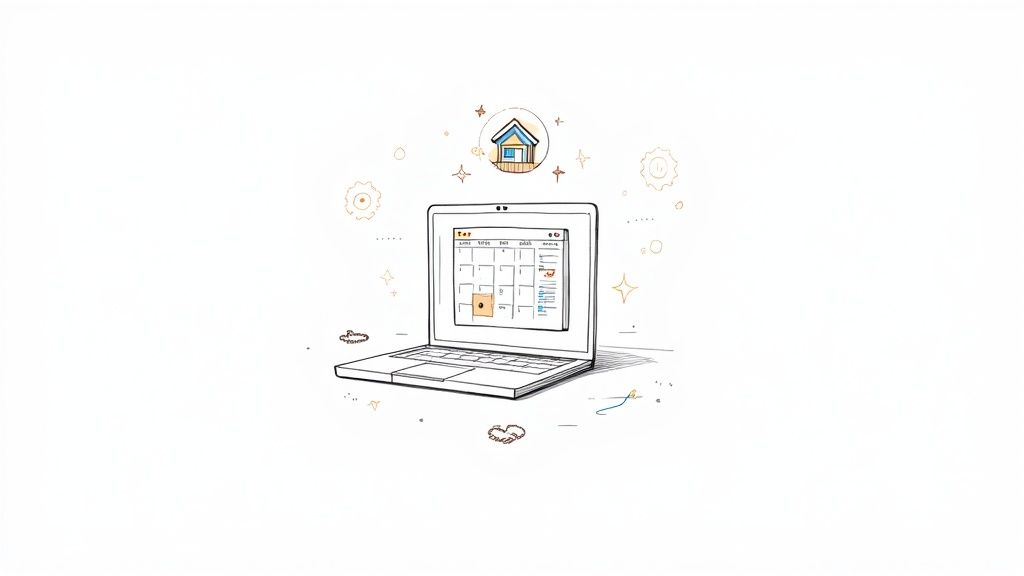
direct booking website
Direct Booking Website for Vacation Rental: Quick Start
Posted on Oct 25, 2025

A direct booking website for your vacation rental is the single most powerful tool you have for breaking free from crushing OTA commissions and building a business that lasts. Think of it as your digital storefront—the one place where you call all the shots, own the relationship with your guests, and keep every dollar of revenue you earn.
Why a Direct Booking Website Is Your Smartest Investment
Relying only on platforms like Airbnb or Vrbo is like building your business on rented land. Sure, they give you eyeballs, but they also skim a hefty chunk off the top and stick themselves right between you and your guests. Launching your own direct booking website for a vacation rental isn't just a cost-saving tactic; it's a strategic play to secure the future of your business.
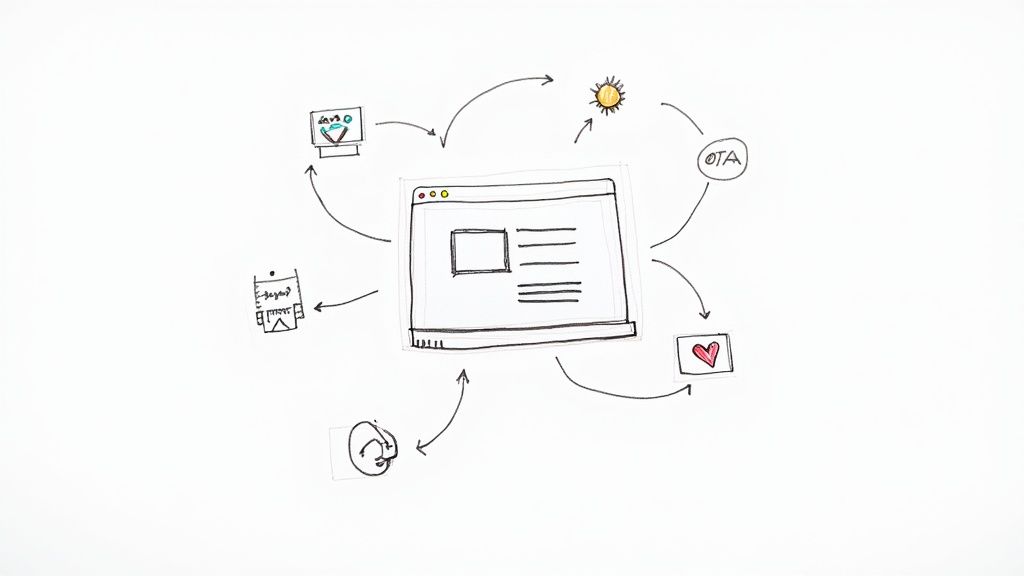
Take Full Control of Your Brand and Revenue
When a guest books through an OTA, they're the OTA's customer, not yours. A direct site completely flips that script. You're in charge of the entire guest journey, from the moment they land on your page to the thank-you email you send after their stay.
This ownership unlocks some serious advantages:
- Build Your Brand: Finally, you can tell your property's unique story. Use stunning, professional photos, write descriptions with personality, and create a genuine "About Us" page that builds trust and makes a real connection.
- Create Upsell Opportunities: Offer the kinds of add-ons the big platforms can't, like a late check-out, a mid-stay cleaning service, or even curated local experiences with tour guides you partner with. These are brand new revenue streams just waiting to be tapped.
- Cultivate Guest Loyalty: By capturing guest emails directly, you can build a powerful marketing list. Send out newsletters, announce special offers, and encourage repeat bookings. You're not just getting a one-time visitor; you're creating a fan for life.
Direct Bookings vs OTA Bookings Key Differences
Let's quickly break down why shifting your focus to a direct booking strategy is such a game-changer compared to staying reliant on Online Travel Agencies (OTAs).
| Feature | Direct Booking Website | OTA Platform |
|---|---|---|
| Commissions | 0% (You keep all booking revenue) | 15-20% or more per booking |
| Guest Data | You own all guest contact and booking information. | The OTA owns the guest data, limiting your marketing efforts. |
| Brand Control | Complete control over your branding, photos, and messaging. | Limited branding within the OTA's templated format. |
| Guest Relationship | Direct communication and relationship-building with guests. | Communication is filtered and controlled by the platform. |
| Upsell Potential | Unlimited opportunities for add-ons and personalized offers. | Very limited or no ability to upsell services. |
| Payment Processing | You choose your processor; funds are deposited quickly. | Payouts are often delayed and subject to OTA policies. |
| Flexibility & Rules | You set your own cancellation policies, rules, and promotions. | You must adhere to the OTA's strict policies and rules. |
The table makes it pretty clear: a direct booking site puts the power—and the profit—back in your hands.
A Real-World Success Story
I know a host with a handful of beautiful lakeside cabins. When she started, over 90% of her bookings were coming from the big platforms. After launching a simple, clean website and offering a small "book direct" discount, she shifted 40% of her bookings to her own site within the first year.
The move didn't just save her thousands in commissions. It also created a loyal base of repeat guests who now book their summer trips a year in advance, giving her predictable revenue she can count on.
The financial impact is huge. We're seeing that direct bookings can bring in roughly 60% more revenue per booking compared to one made through a third-party site. Moving away from commission-heavy channels and embracing a direct model fundamentally changes your profitability.
Building your own site is the definitive first step toward creating a resilient, independent, and far more profitable rental business. And with the right tools, it's more achievable now than ever. For a deeper dive into the essential software you'll need, check out our complete guide on direct vacation rental software.
Setting the Stage for Your Booking Website
It's tempting to dive right into picking a website template, isn't it? That's actually one of the most common mistakes I see hosts make. Before you even think about colors and fonts, you need a rock-solid strategy. Getting this foundational work done upfront ensures your direct booking website for a vacation rental is more than just a pretty face—it's a high-performing machine.
Believe me, making these smart decisions now will save you from some serious headaches down the road.
First things first, let's nail down your brand identity. What’s the unique flavor of your property? We're talking about more than just the number of bedrooms. Is it a pet-friendly mountain escape for adventurous families? Or is it a slick, urban loft perfect for business travelers? Your brand is the feeling you want guests to have and the promise you deliver.
When you get this right, you can start telling a story that actually connects with people. A brand built around a "rustic cabin retreat," for example, would naturally lead to earthy tones, cozy photos, and descriptions that evoke relaxation and a connection to nature. This clarity will become your north star for every decision, from your domain name to the way you describe the master bedroom.
Define Your Ideal Guest
Once your brand has a pulse, you need to know exactly who you're talking to. This is where creating a detailed guest persona becomes a total game-changer. Don't just settle for "families." Get granular.
Picture the "Millennial Adventure Family"—two parents in their mid-30s, a couple of young kids in tow. They're all about experiences, not just luxury amenities. They’re the ones searching for "kid-friendly hikes" or "cabin rentals near state parks."
Knowing this persona inside and out helps you:
- Choose the Right Photos: Instead of sterile shots of empty rooms, you'll feature a family playing board games by the fire.
- Write Compelling Copy: You'll highlight the things they care about, like a fully-stocked kitchen for easy meals or a secure yard where the kids can run wild.
- Select a Memorable Domain: A name like
CreeksideFamilyCabins.cominstantly clicks with them in a way a generic URL never could.
This laser focus ensures your marketing efforts pull in the right guests—the ones who will fall in love with your place, leave glowing reviews, and book again and again.
Choose Your Platform Wisely
The platform you build on is the digital foundation of your business. You really have two main paths to go down: user-friendly website builders or specialized vacation rental software. Each has its own set of trade-offs.
General website builders like Squarespace or Wix are known for being intuitive and visually flexible. They're fantastic for creating a beautiful site that looks completely custom. The catch? You'll have to bolt on a third-party booking plugin and manually wrestle with calendar syncing, which can get complicated and messy, fast.
On the flip side, specialized property management systems (PMS) offer an all-in-one solution. These platforms are purpose-built for hosts, with integrated booking engines, payment processing, and automatic calendar syncing across all your channels (think Airbnb and Vrbo). They might offer a little less design freedom, but they save hosts an average of 5-7 hours per week on tedious admin tasks.
Your platform choice should be about your long-term vision. If you plan on scaling your business, a specialized system with powerful automation is going to be your best friend. Don't just pick the cheapest option; think about the time and operational sanity you'll gain.
Your Pre-Build Asset Checklist
Before you start clicking around in a website builder, do yourself a huge favor and get all your essential assets gathered in one place. A little prep work here makes the entire process incredibly smooth.
Here’s your checklist:
- Professional Photos and Videos: This is non-negotiable. Your visuals do the heaviest lifting.
- Detailed Property Descriptions: Write them to be compelling for humans and optimized for search engines.
- A List of Amenities: Get specific and be thorough. Don't forget the small things.
- Guest Testimonials: Pull your absolute best reviews from other platforms. Social proof is gold.
- Your Brand Logo: Have a high-resolution version ready to go.
- A Chosen Domain Name: Secure it before you start building anything.
With this strategic groundwork in place, you’re ready to shift from planning to building—and create a website that truly works for you.
Designing a Site That Converts Views into Stays
Your website's design is so much more than just a pretty face; think of it as your silent salesperson, working 24/7 to build trust and guide visitors straight to that "Book Now" button. A truly effective direct booking website for a vacation rental makes the decision to stay with you feel easy, safe, and genuinely exciting. It’s all about creating an experience that feels intuitive and builds confidence from the very first click.
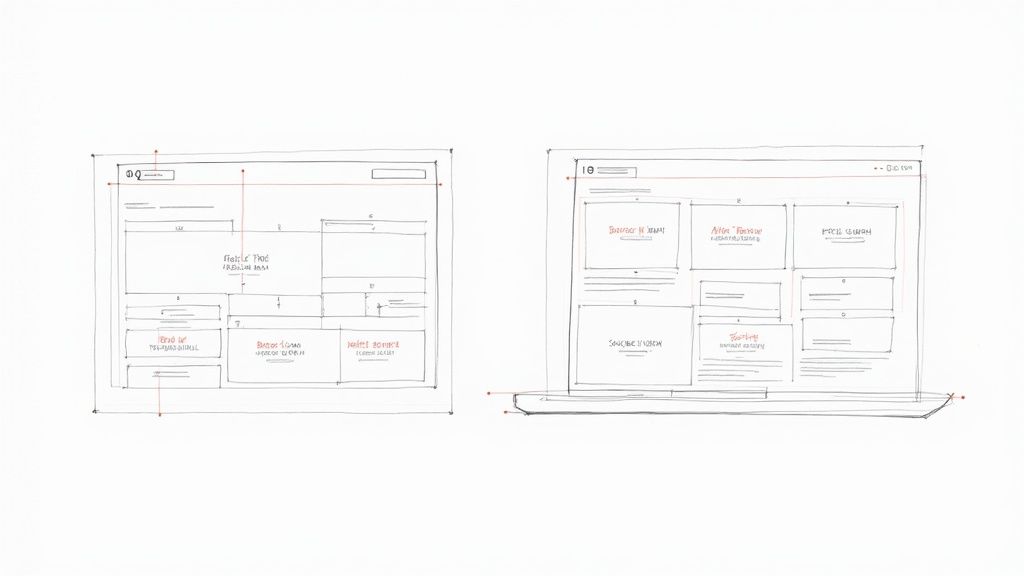
This journey starts the moment someone lands on your homepage. It needs to be clear and engaging, immediately showing off your property’s best features and what makes it special. From there, it's all about detailed property pages filled with high-resolution photos that tell a compelling visual story. And don't ever underestimate the power of a personal touch—a genuine "About Us" page can forge a connection that the big OTAs simply can't replicate.
Crafting a High-Converting User Experience
User experience (UX) is the invisible architecture holding your site together. It’s not just about making your site look beautiful, but making it incredibly simple to use—especially on mobile, where most travel planning kicks off these days. Put yourself in your guest's shoes: can they find your availability and pricing in a matter of seconds?
Your navigation should be dead simple and predictable. Visitors expect to see links like "Properties," "About Us," and "Contact" right where they can see them. Anything more complicated just creates confusion and sends people clicking away.
This focus on a smooth, easy journey is exactly why so many travelers are now choosing to book direct. In fact, a whopping 67% of travelers report that booking directly on a brand’s website is easier than wrestling with a third-party platform. This stat alone reveals a huge opportunity for hosts willing to invest in a seamless and trustworthy direct booking experience.
Essential Elements for Building Trust and Driving Action
Beyond a clean layout, a few key pieces have to work together to turn a casual browser into a confirmed guest. Your website must feel both professional and personal to earn that all-important trust.
- Professional Photography is Non-Negotiable: Your photos are, without a doubt, your single most important selling tool. Hire a pro or get serious about learning real estate photography to capture bright, inviting shots that showcase your property's best angles and unique amenities.
- Compelling Property Descriptions: Don't just list features. Tell a story. Sell an experience. Describe the feeling of waking up to that mountain view or sipping coffee on the private balcony. Weave in your SEO keywords naturally to make sure the right people find you in the first place.
- Strategically Placed Calls-to-Action (CTAs): Bright, clear buttons like "Check Availability" or "Book Your Stay" should be impossible to miss. Place them prominently on your homepage and throughout your property pages to give visitors a gentle, obvious nudge toward the next step.
Your goal is to eliminate every single bit of friction between the moment a guest falls in love with your photos and the moment they pull out their credit card. Every page, every button, and every word should be designed to make that process effortless.
By focusing on these core design principles, you're not just building a website; you're creating a powerful conversion machine. To dive deeper, check out our guide on the 14 must-have features for a high-converting short-term rental website.
Choosing Your Booking Engine and Payment Gateway
If your website's design is the showroom, then the booking engine and payment gateway are the engine room. This is the technical heart of your whole operation, the part that securely processes payments and turns a casual browser into a confirmed guest on your direct booking website for a vacation rental. You absolutely have to get this right for a smooth guest experience.
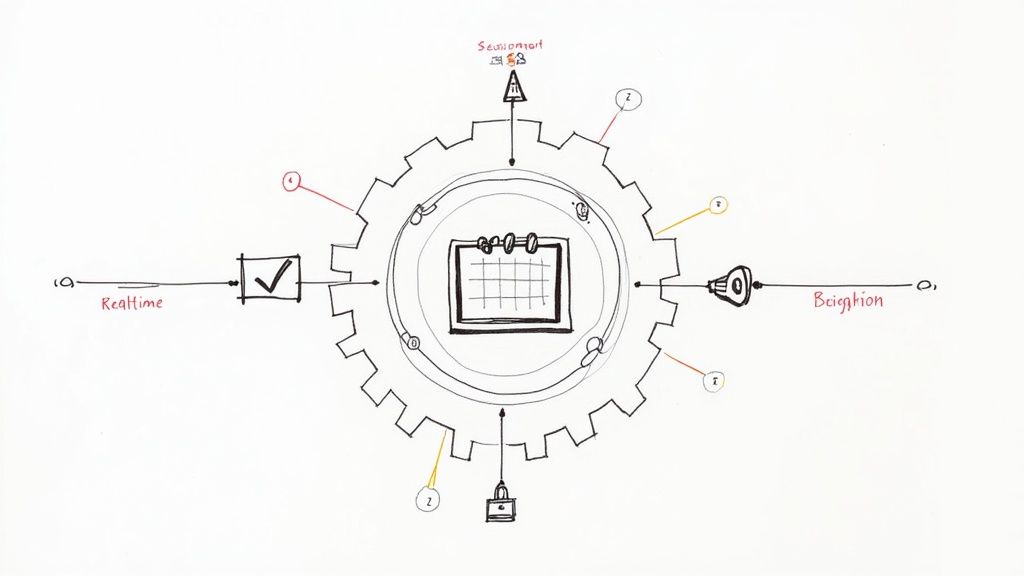
The first fork in the road is deciding between an all-in-one platform or a separate plugin. All-in-one solutions, which are often baked into a Property Management System (PMS), are built from the ground up for rentals. They package the website builder, booking engine, and channel manager into one system, which seriously cuts down on the technical headaches.
The other path involves using a general website builder like WordPress or Squarespace and then bolting on a third-party booking plugin. While this gives you more creative control over the design, it can get complicated when you're trying to sync calendars and integrate payments. Honestly, if you're juggling more than one property, an all-in-one system is almost always the saner choice.
Must-Have Booking Engine Features
Not all booking software is built the same. As you start comparing your options, zero in on the features that will directly boost your revenue and make your life easier. You're looking for a powerful management tool, not just a simple calendar.
Here's what I consider non-negotiable:
- Real-Time Calendar Syncing: This is the big one. It uses iCal technology to instantly update your availability across your own site and your OTA listings (like Airbnb and Vrbo). No more double-booking nightmares.
- Dynamic Pricing Tools: Being able to set automatic pricing rules for different seasons, holidays, weekends, or length of stay is a game-changer. It lets you maximize what you earn without having to manually tweak rates all the time.
- Automated Guest Communications: Find a system that can fire off automatic emails for things like booking confirmations, check-in instructions, and post-stay review requests. This alone will save you hours of busywork.
Choosing your tech stack is about building for the future. Don't just solve today's problems; pick a system that can scale with you as you grow your portfolio and your direct booking revenue stream.
Secure and Frictionless Payment Processing
Finally, you need a rock-solid way to take payments. This is where a trusted payment gateway steps in. Guests are rightfully careful about where they enter their credit card details online, so using a recognizable name is key to building trust.
There's a reason Stripe and PayPal dominate the industry. They offer top-notch security, deal with all the complex compliance stuff for you, and give guests a checkout experience they're already comfortable with. The good news is that most modern booking engines integrate directly with them, making setup surprisingly simple.
The market for this is huge and only getting bigger. The U.S. vacation rental market is on track to hit $22.11 billion, and 85% of that revenue will come from online sales. With demand growing, having a perfect payment system is the only way to capture your slice of the pie. Dig into some more vacation rental statistics if you want to see the full picture.
Driving Traffic with Smart SEO and AI Tools
So you’ve built a stunning website. That’s a huge first step, but it's only half the battle. Now, you need to get your direct booking website for a vacation rental in front of travelers who are actively searching for a place just like yours. This is where smart search engine optimization (SEO) and modern marketing tools come into play, turning your beautiful site into a magnet for direct bookings.
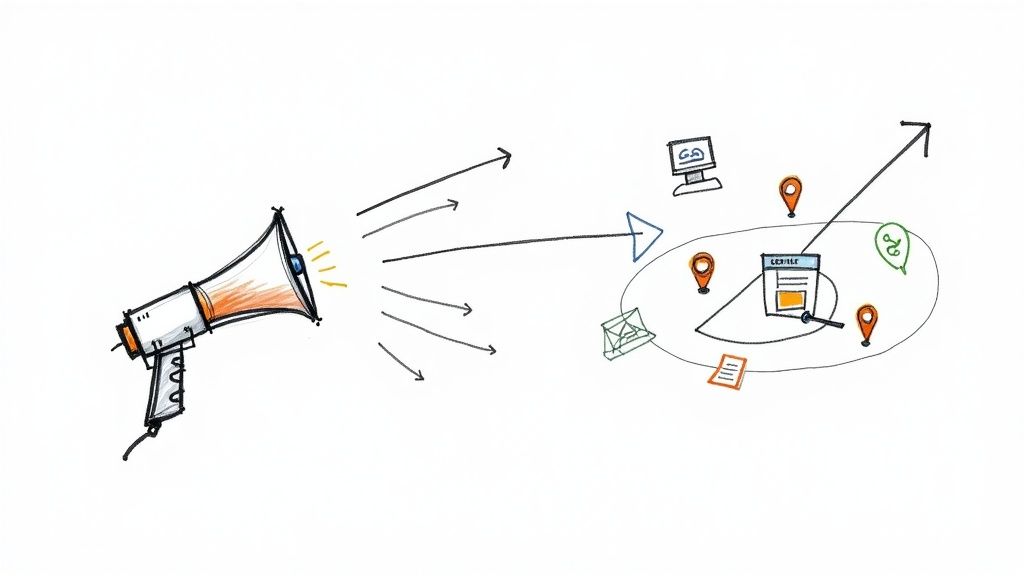
Without a steady stream of visitors, even the most perfectly designed website is just a billboard in the desert. The good news? You don’t need a massive marketing budget to compete; you just need a focused, clever strategy.
The shift towards direct bookings isn't just a hunch—it's a clear trend. Recently, about 37.5% of vacation rental operators reported a serious uptick in direct bookings. This surge is being driven by savvy hosts investing in their own branded websites, effective SEO, and programs that keep guests coming back. You can dig deeper into this trend and what it means for vacation rentals to see where the industry is heading.
Mastering Local SEO for Your Vacation Rental
For vacation rentals, SEO is all about winning the local search game. When a potential guest searches for “cabin rental in Asheville,” you want your property to pop up right at the top of that list. That all starts with targeted local keyword research.
Put yourself in your ideal guest's shoes. What specific phrases would they actually type into Google?
- Instead of a generic "vacation rental," they might search for a "pet-friendly condo near downtown Austin."
- Rather than just "beach house," they could be looking for a "family beach house with a pool in Destin."
Once you’ve brainstormed these phrases, weave them naturally into your property descriptions, page titles, and even your blog posts. A powerful—and completely free—tool in your local SEO arsenal is your Google Business Profile. Claiming and fully optimizing this listing puts your property right on Google Maps and in local search results, complete with photos, reviews, and a direct link to your booking site. It's a must-do.
Your goal isn't to rank for every travel-related term out there. It's to dominate the specific, high-intent searches that bring qualified guests—those ready to book—directly to your digital doorstep.
Automating Your Marketing with AI
This is where you can really get a leg up on the competition. Modern AI tools, like those built into the hostAI platform, are designed to automate and optimize the most time-consuming parts of marketing. These systems can help you generate SEO-friendly property descriptions, write engaging blog posts about local attractions, and even create targeted email campaigns for past guests.
For instance, an AI tool can analyze which of your marketing emails get the most opens and clicks, then help you craft more effective subject lines for future campaigns. This means you’re not just sending messages into the void; you’re sending messages that actually convert, all without needing to become a marketing expert overnight.
By letting technology handle these tasks, you can focus on what you do best—providing an amazing guest experience—while the AI works in the background to keep your booking calendar full. If you’re curious about how this all works, you can explore some of the best AI marketing tools available for hosts and see how they can streamline your efforts.
Your Direct Booking Website Questions Answered
When you're thinking about launching a direct booking site, a lot of practical questions pop up. That’s completely normal. Let's cut through the noise and get you some clear, straightforward answers to the most common questions I hear from hosts.
How Much Does It Cost to Build a Direct Booking Website?
The honest answer? It depends. The cost can swing pretty wildly based on the route you take.
If you’re the DIY type, you could use a website builder like Squarespace and connect a third-party booking plugin. This path usually runs between $30 to $60 a month. You get full creative control, but you're also the one doing all the work to piece it together and keep it running smoothly.
A more popular option is an all-in-one vacation rental software. These platforms bundle your website, booking engine, and channel manager into one neat package, often for $50 to over $200 monthly. Yes, the subscription is higher, but the sheer amount of time you save on admin tasks usually makes it well worth the investment.
The most expensive route is a fully custom-built site, which can run into several thousand dollars upfront.
Don't forget the little things. Budget for a custom domain name (around $15 per year) and professional photography. Seriously, good photos are non-negotiable—they're the single most important factor in making a great first impression.
Can I Sync My Direct Booking Calendar with My OTA Listings?
Yes, and you absolutely must. If you don’t, you're practically inviting double bookings to ruin your day (and your reputation).
Luckily, this is a solved problem. Nearly every modern booking engine or Property Management System (PMS) uses a simple but powerful technology called iCal integration.
It’s the magic that keeps your availability in sync everywhere. When a guest books a long weekend directly on your site, iCal automatically blocks those dates on your Airbnb, Vrbo, and Booking.com calendars. This two-way street ensures your calendar is always accurate, saving you from a world of operational headaches.
What Are the Most Important Features for a Vacation Rental Booking Engine?
It's easy to get sidetracked by flashy features that sound cool but don't actually move the needle. When you’re shopping for software, zero in on the tools that directly impact the guest experience and your revenue.
Here’s what should be on your must-have list:
- A real-time availability calendar: It needs to be crystal clear and dead simple for guests to use on any device.
- Secure online payment processing: Look for integration with trusted names like Stripe or PayPal.
- Automated guest emails: This is a huge time-saver. Think booking confirmations, pre-arrival info, and check-out reminders.
- Dynamic pricing rules: You need the flexibility to adjust rates for seasons, holidays, or specific lengths of stay without doing it all by hand.
- A mobile-first design: Most travelers book on their phones. Your site has to make it easy for them.
And if you manage more than one property, that iCal sync we just talked about becomes the single most important feature. It’s the backbone of any smart distribution strategy.
Ready to build a powerful direct booking website that attracts guests and automates your workload? hostAI uses advanced AI to create intelligent websites and marketing campaigns that are proven to increase direct revenue. Discover how hostAI can transform your vacation rental business.